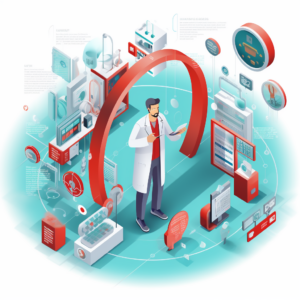 In the rapidly evolving landscape of healthcare, effective patient outreach and engagement are more critical than ever. Predictive dialing, a technology that automates and optimizes outbound calling, has emerged as a valuable tool in improving patient communication. In this article, we’ll explore how predictive dialing is transforming healthcare by streamlining patient outreach and enhancing overall care delivery.
In the rapidly evolving landscape of healthcare, effective patient outreach and engagement are more critical than ever. Predictive dialing, a technology that automates and optimizes outbound calling, has emerged as a valuable tool in improving patient communication. In this article, we’ll explore how predictive dialing is transforming healthcare by streamlining patient outreach and enhancing overall care delivery.
**1. Efficient Appointment Reminders: Predictive dialing systems can automatically contact patients to remind them of upcoming appointments. This reduces no-show rates, optimizes scheduling, and ensures that healthcare providers can make the most of their resources.
**2. Medication Adherence: Healthcare organizations use predictive dialing to encourage medication adherence. Automated calls can remind patients to take their prescribed medications, follow specific dosages, and monitor their progress, leading to better health outcomes.
**3. Health Education and Follow-Ups: Healthcare providers leverage predictive dialing for health education initiatives. Automated calls can deliver vital information about managing chronic conditions, lifestyle changes, and post-treatment follow-up instructions.
**4. Surveys and Feedback Collection: Healthcare organizations use predictive dialing to gather patient feedback through automated surveys. This valuable data helps assess patient satisfaction, identify areas for improvement, and enhance the quality of care.
**5. Emergency Alerts and Notifications: In emergency situations or public health crises, predictive dialing systems can swiftly reach out to patients with critical information, ensuring timely responses and reducing potential health risks.
**6. Appointment Scheduling and Rescheduling: Predictive dialing systems can handle appointment scheduling and rescheduling, allowing patients to choose convenient times without the need for manual coordination.
**7. Chronic Disease Management: Patients with chronic diseases benefit from automated calls that provide ongoing support and monitoring. Predictive dialing can remind patients of regular check-ups, track vital signs, and prompt them to report any concerning symptoms.
**8. Insurance and Billing Support: Healthcare organizations use predictive dialing to assist patients with insurance-related inquiries, billing questions, and payment reminders, contributing to improved financial transparency and patient satisfaction.
**9. Behavioral Health and Mental Health Support: Predictive dialing systems can play a crucial role in mental health care by providing regular check-ins, delivering coping strategies, and offering crisis support.
**10. Language and Cultural Sensitivity: Many predictive dialing systems are designed to accommodate multiple languages and cultural sensitivities, ensuring that a diverse patient population receives personalized and accessible care.
**11. Improved Resource Allocation: Predictive dialing optimizes resource allocation by reducing the time and effort required for manual outreach. Healthcare staff can focus on more complex patient interactions, enhancing overall efficiency.
**12. Privacy and Data Security: Advanced predictive dialing systems prioritize patient privacy and data security. They comply with healthcare regulations, such as HIPAA (Health Insurance Portability and Accountability Act), to protect sensitive medical information.
**13. Analytics and Reporting: Predictive dialing systems provide valuable analytics and reporting tools. Healthcare organizations can track call outcomes, patient responses, and engagement rates, enabling data-driven improvements in outreach strategies.
**14. Customization and Personalization: Predictive dialing can be customized to deliver personalized messages and responses based on patient profiles and preferences, fostering stronger patient-provider relationships.
In conclusion, predictive dialing is a powerful tool in healthcare that streamlines patient outreach, improves engagement, and enhances the overall care experience. By automating routine communication tasks and leveraging data-driven insights, healthcare organizations can optimize resource allocation, reduce administrative burdens, and, most importantly, deliver better patient care. As technology continues to advance, predictive dialing will play an increasingly vital role in shaping the future of healthcare communication and patient engagement.
© 2025 etollfree.net — All rights reserved.
We’re on a mission to build a better future where technology creates good jobs for everyone.